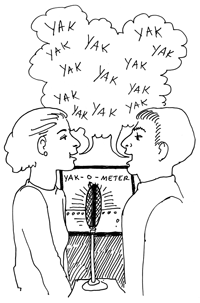STRANGE BUT TRUE- Yakkety yak: Men talk just as much as women!

DRAWING BY DEBORAH DERR McCLINTOCK
Q. Why are women such big talkers? Or are they? –J. Rivers
A. You'd certainly think so based on media reports putting them at 20,000 words per day vs. only 7,000 for men, even though not a single study has systematically recorded the natural conversations of large groups of people, say Matthias Mehl and colleagues in Science magazine. A British study estimated the numbers at 8,800 vs. 6,100, though its authors admitted a possible flaw in that participants could manually turn off their recorders whenever they chose to.
Then Mehl introduced electronically activated recorders that track real-world minute-to-minute interactions, turning on every 12.5 minutes for 30-second talk samples. And here, averaged over six groups of university students– five U.S and one Mexico– the women spoke about 16,200 words per day, the men 15,700, which is not a statistically significant difference. In other words, both average about 16,000 words per day, though with very large individual differences.
"Thus we conclude on the basis of available empirical evidence that the widespread and highly publicized stereotype about female talkativeness is unfounded," Mehl writes.
Q. You've no doubt encountered this word countless times, having read it, spoken it, written it, heard it. Sure would be nice if you successfully identified this common adjective. –P. Roget
A. Nice it is, from Right, Wrong, and Risky: A Dictionary of Today's American English Usage, by Mark Davidson. It's a kind of "shaggy, all-purpose" term, though originally signifying "simple-minded, stupid" (c. 1290), from the Latin for "ignorant, not knowing."
In the 14th century, Chaucer used it to mean "wanton, licentious," then from the 15th to the 18th century, it took on the sense of "coy, reserved, diffident." In the 16th century, it acquired two still current senses, "fussy" and "precise." In the 18th century, the word began its modern career as a compliment that damns with faint praise, meaning "agreeable, pleasant, courteous, considerate."
Q. What's the slick trick to passing a solid wire through a solid piece of ice, without applying heat or using legerdemain? This is one even the great Harry Houdini might have appreciated. –J. Frost
A. You put the ice under pressure, thereby reducing its melting point, then remove the pressure and the ice refreezes, a process called "regelation," says Alain Hache in The Physics of Hockey. To do this, take a long ice
block supported at both ends and hang on it two weights, connected by a thin wire. Because of pressure melting, the ice under the wire liquefies, allowing the wire to cut into it. As the wire passes through, the water above it is no longer under pressure and refreezes instantly. "The result is a wire that seems to magically penetrate the solid ice," Hache writes. "Eventually the wire cuts completely through and the masses fall away, leaving the ice block intact. Yes, Houdini certainly would have been impressed!"
Q. Are you Shakespearean scholar enough to decode this one: "In one of the bard's best-thought-of tragedies, our insistent hero, Hamlet, queries on two fronts about how life turns rotten." –S. Colley
A. It'll take some checking, but this is an anagram for the opening of Hamlet's famous soliloquy, "To be or not to be, that is the question, whether 'tis nobler in the mind to suffer the slings and arrows of outrageous fortune," says Richard Wiseman in Quirkology: How We Discover the Big Truths in Small Things. Given the large number of combinations of letters in the words, and the huge amount of text in plays and books, it's not surprising (by the "law of large numbers") that once in a while amazing anagrams do emerge. "What is perhaps more surprising is that some people are prepared to invest significant amounts of their time looking for them," Wiseman says.
Send Strange questions to brothers Bill and Rich at [email protected].
#